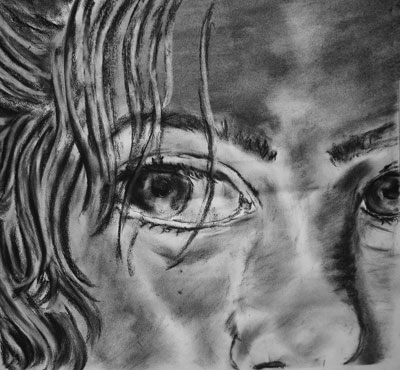All Nonfiction
- Bullying
- Books
- Academic
- Author Interviews
- Celebrity interviews
- College Articles
- College Essays
- Educator of the Year
- Heroes
- Interviews
- Memoir
- Personal Experience
- Sports
- Travel & Culture
All Opinions
- Bullying
- Current Events / Politics
- Discrimination
- Drugs / Alcohol / Smoking
- Entertainment / Celebrities
- Environment
- Love / Relationships
- Movies / Music / TV
- Pop Culture / Trends
- School / College
- Social Issues / Civics
- Spirituality / Religion
- Sports / Hobbies
All Hot Topics
- Bullying
- Community Service
- Environment
- Health
- Letters to the Editor
- Pride & Prejudice
- What Matters
- Back
Summer Guide
- Program Links
- Program Reviews
- Back
College Guide
- College Links
- College Reviews
- College Essays
- College Articles
- Back
Children
The last time I saw her, she wore blue eye shadow and a thin shirt with lace poking up past the neckline. Even then she looked fragile, but I wasn’t sure if it meant that she was delicate or that she would have been easily broken, and I had heard neither. I hugged the wall and pulled my books into my chest as she past me, Maybelline lashes touching her eyebrows and glossed mouth open. The whispers, though, they hugged me: “slut”, “b****”, “whore.” It was a Friday morning, and she held her books the same way I did, came from the same choir I was headed to, but any outside her could have told you we were different. No one leapt away from me; my name wasn’t hissed in locker rooms or giggled at when manicured nails unfolded cruelly neat notes.
The first time I’d heard her name was that September, crouched behind my friend’s open locker door. We were in seventh grade then, but our tongues were well trained in the art of forking and flicking. “She banged her boyfriend, but then she said he raped her.” “She’s a slut. Period.” “They say she got knocked up; that’s why she called it rape. But she wanted it, look at her.” I listened with my books pressed up against my flat chest, tugging my sweater up towards my collarbones and wondering if my jeans were too tight, or my lip-gloss too heavy. We all knew the rules: we knew what to cover and leave bare within an inch, we knew how much tongue made you a whore and how much made you a good girlfriend, we knew women submitted to men because Jesus said so, and we knew that breaking a rule was an invitation. We knew to be good girls.
It was a Saturday; I remember because we had a concert that morning, and that was when the whispers started. The crowds swelled in the halls and pressed my back up against the lockers, and I saw the girl in my small ensemble coming before I heard. Her face was the color of unwashed bed sheets, and her painted lips had gone pale. She was dead, the girl said, scrolling through her texts with flying thumbs. It was an allergic reaction, they said before the burial. The girl’s family was Catholic, at least that’s what I remember, and it wasn’t until after they sprinkled holy water on her casket that mutters turned to “overdose.” “You know what she was like,” I heard them snicker. But I pulled my books in tighter, nestling them between my ribs to keep my gut untangled as I placed a fruit cup on my tray. I studied the marble pattern and the way the plastic curled at the edges, and slapped cash and change in the cashier’s meaty palm without looking up.
I don’t know when I first heard she had killed herself. It had been two weeks, or maybe less; I don’t know anymore because I tried to forget. I didn’t know her, I’d said the first time I had heard, and that was what I was still saying when I heard it was confirmed. When I got to school that day, I jammed my books so hard in my stomach that they left a line, thick as a scar, because I listened. There was the boy who told her best friend to kill herself. There were the girls who went around the hall singing like poisoned canaries: “Ding, dong, the witch is dead,” before dissolving into giggles. And then there were the Bible thumpers, hoards of Catholics and fundamentalists and people who saw the inside of a church only on Christmas and Easter but claimed their name, who made the halls swollen with raging over hell and damnation, fire and brimstone. There were the children who blocked mourning children in the cafeteria and told them to go and die with her, and children who grinned at the notion of hell, and children who danced on her grave. I kept my glossed lips pressed in a thin line and tried to force the voices and cries from my ears and wondered, then, what I was. Because, as I stared down at my books and the imprint on my stomach, I knew we were not children anymore.

Similar Articles
JOIN THE DISCUSSION
This article has 0 comments.
